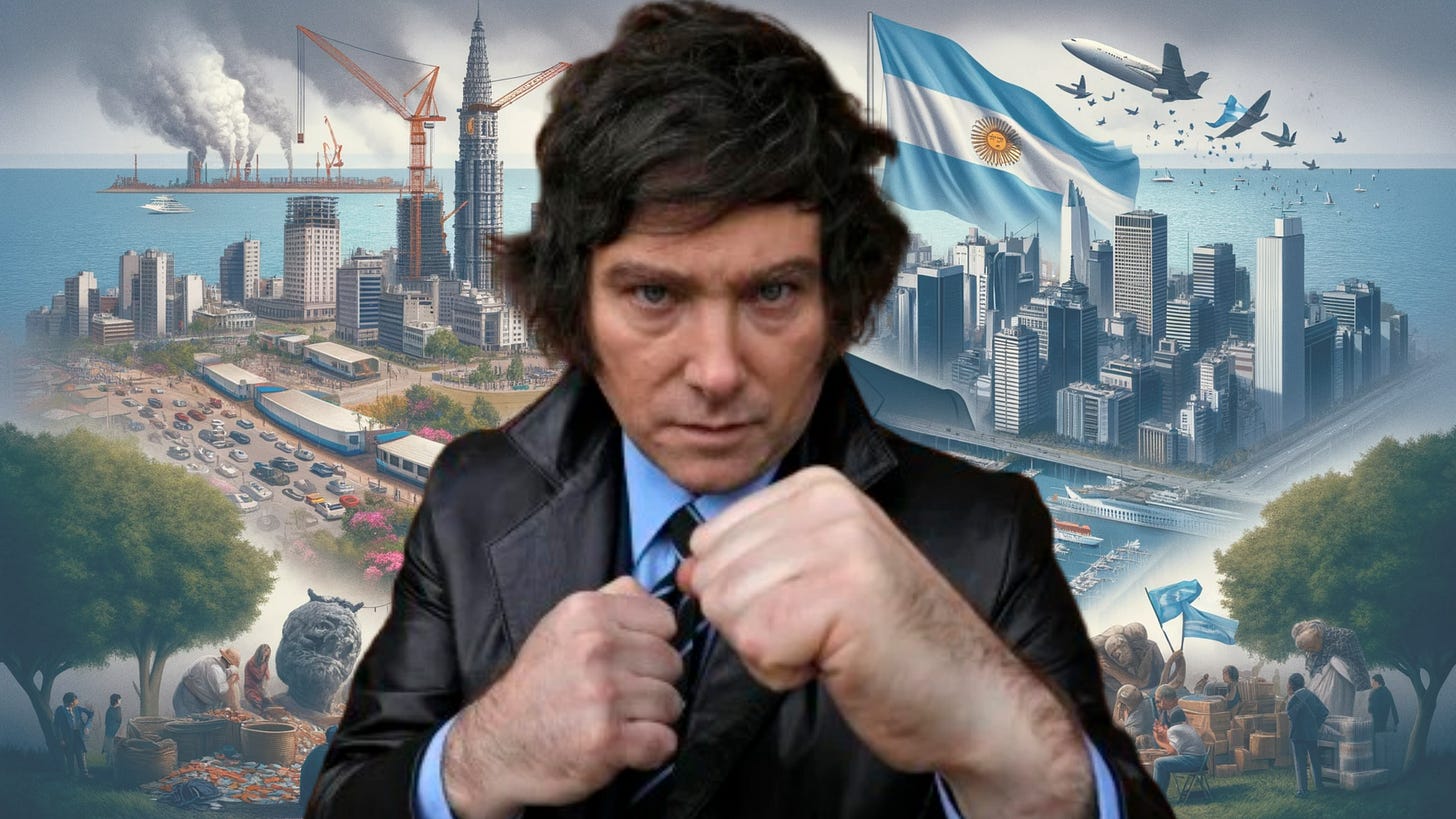Flirting With Disaster: Questionable Choices and Argentina's Economic Peril.
President-elect Milei's Cabinet Controversy: Milei’s Cabinet Choices Seems Ignoring Argentina’s Harsh Economic Realities.
Argentina's president-elect Javier Milei champions libertarian ideals, but his governing choices reveal muddled economic thinking. The appointment of former Finance Minister Luis "Toto" Caputo (“the Messi of Finance”) as Economy Minister shows a troubling disregard for Argentina's debt crisis, signaling a return to the disastrous debt policies of former President Mauricio Macri.
As Finance Minister from 2018-2019, Caputo unleashed an unrestrained borrowing spree that brought Argentina to the brink of default and forced it to beg for a $57 billion bailout from the IMF.
This is the man now tasked with righting Argentina's sinking economic ship under Milei’s watch.
Milei once blasted Caputo for "irresponsibly squandering $15 billion" during his stint as Central Bank chief. But it seems political expediency has overshadowed such critiques.
Indeed, the market-friendly Caputo selection aims to tempt foreign investors and speculators back to Argentina. Yet it ignores the hard lessons learned under Macri about the perils of excessive foreign borrowing.
With Argentina’s debt-to-GDP ratio already hovering around 90%, Milei appears primed to send the country lurching from crisis to crisis once more.
Milei’s selection of Patricia Bullrich as Security Minister similarly seems better suited to electioneering than governance. Bullrich previously held the same post under Macri, where she pushed a law-and-order agenda amid rising violence and unrest.
While talking tough may score political points, Bullrich's ineffective policies saw homicide rates continue rising and prisons grow more overcrowded. Her reappointment ignores these failures while offering little new thinking on citizen security.
Meanwhile, the surprise appointment of Mauricio Macri loyalist Luis Petri as Defense Minister further cements Milei’s alignment with Argentina’s rightward drift. Petri’s calls to “revalue the role of the Armed Forces” hint at ambitions beyond mere national defense. With massive fiscal constraints already restricting social spending, one must ask if boosting military budgets should really be the priority now.
Here Milei appears to be offering ideological red meat rather than sound policy.
Seeking to ease tensions, Milei's future Foreign Minister Diana Mondino met with her Brazilian counterpart Mauro Vieira to discuss strengthening bilateral ties and Mercosur integration. Mondino extended an olive branch by personally inviting President Lula da Silva to Milei's inauguration in a letter underscoring shared interests. Vieira welcomed the constructive talks, emphasizing that partnerships between both countries would deepen further. He expressed optimism about collaborating with current and incoming Argentine administrations to advance Mercosur negotiations with other regions, satisfied with progress made.
Both sides pledged commitment to the trade bloc and recognized common cause in promoting regional pacts, signaling Milei's aim for pragmatic engagement with Brazil despite apparent ideological differences with Lula. Dispelling doubts cast during the election, this diplomatic outreach demonstrates that despite bombastic rhetoric no concrete dispute over Mercosur's future direction appears imminent.
Then there is the change of policy on BRICS membership. Milei’s future Foreign Minister Diana Mondino announced last week that Argentina will not join BRICS as scheduled on January 1st, reneging on the previous government's agreement. This despite Chinese President Xi Jinping personally extending an olive branch to Milei and highlighting the “shared profits” to be had between their nations.
Turning down BRICS is a strange move for a president facing depleted currency reserves, spiraling inflation and a need for infrastructure investment. BRICS offered Argentina a potential lifeline of trade and financing outside the strictures of US-dominated institutions like the IMF.
Yet Mondino herself admitted Argentina sorely lacks the capital reserves to contribute to the New Development Bank that undergirds BRICS.
In essence, Milei's administration has spurned a vital economic partnership at the very moment it needs one most. Whether due to ideological rigidity or sheer diplomatic ineptitude, this BRICS break promises further uncertainty for Argentina’s economy.
Of course, relations with China, Brazil and other BRICS countries will continue at a commercial level. But Milei's refusal to engage with these important global powers on a state basis seems disastrous given Argentina's widening leadership void in Latin America and the world.
With the IMF straightjacket tightening and Western powers distracted, now more than ever Argentina must nurture diverse foreign alliances, not squander them.
By appointing an imprudent debt-peddler as Economy Minister while alienating Argentina's neighbors and largest trade partners, Milei risks exacerbating the spiraling “Macrisis” he inherited.
His first moves don't inspire confidence in Argentinean economic sovereignty or sustained growth. Unless Milei changes course quickly, another default may loom. One fears Argentina’s long-suffering people will face fresh financial perils under his watch.
Ultimately, the Argentine people deserve prosperity and stability after years of economic volatility.
If Milei's heterodox policies can deliver that, it will be a remarkable achievement. But spurning partnerships with its largest regional allies and trading partners remains a questionable decision, no matter the political rationale. This could isolate Argentina diplomatically and economically at a time it desperately needs integration. Still, one hopes for the sake of Argentines that Milei's controversial gambles pay off in the long run.
Even outside BRICS and with strained regional relations, there exist paths for Argentina to achieve self-sufficiency. Backed by pragmatic policies rather than ideology alone, the country could still work towards securing financial sovereignty and sustainable growth that improves its citizens’ livelihoods. This must remain the priority, despite these early (apparent) missteps.






